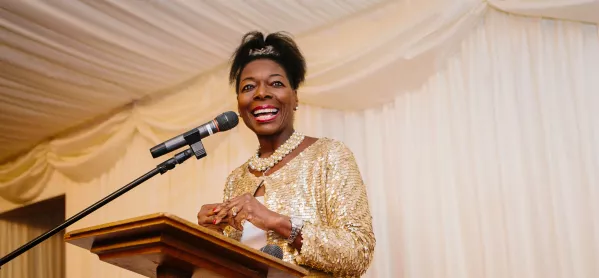- Home
- Five messages to inspire school leaders
Five messages to inspire school leaders

For the past two days, more than 1,000 school leaders from across the country have gathered for an event aimed at inspiring them.
The Inspiring Leadership Conference, in Birmingham, saw a range of speakers from sport, television, music and academia take to the stage to share their thoughts on the importance of leadership.
Here are five things heads have taken away.
1. Pupils’ childhoods last a lifetime
On the opening day of the conference, Baroness Floella Benjamin told heads that the input children receive during their education will shape the rest of their lives.
The former television star told her audience: “Childhood lasts a lifetime.”
She illustrated this by telling teachers of her own childhood, how her family was split up in Trinidad when her parents came to the UK, and how - when she joined them here - she endured racist bullying from other children.
However, she said that her parents and her education had given her the self-belief to overcome this.
She told school leaders that they were charged with “changing the world and making a difference. You are there to inspire others. To bridge the social mobility gap. To give children the confidence that they to can go out and change the world.”
2. Be aware of your ‘inner chimp’
Professor Steve Peters, a psychiatrist who works in elite sport, entertained headteachers by telling them that they each had “an inner chimp” within them which influenced how they act.
But the professor, who specialises in the functioning of the human mind, had a serious point to make about how the brain works and how people can consciously change how they respond to situations.
He explained that his model sees the brain as being divided into three teams. The first is the conscious thinking analysing person who he describes as “the real you.” Then there is an inner chimp an independent part of our brains which is not under our control, and finally, a computer which stores information for both the rational and inner chimp brain can draw from.
Prof Peters says that it is “the chimp” which drives our angry and frustrated responses in life. He told heads that by being aware of this they can ensure they make more rational decisions.
3. Set long-term goals
Heads were taken back to the Rio Olympics with an inspiring video of Team’s GB’s hockey team’s gold medal triumph.
However, star players Kate and Helen Richardson-Walsh told them that behind this success story was 17 years of competing and many years of falling short.
In a message which seemed to resonate with heads, they told their audience that the team’s success was underpinned by having a clear idea of what their culture was and a vision of what they wanted to achieve.
Kate Richardson-Walsh said after team meetings they decided that their core focus would be built around three key themes: “Be the difference, create history and inspire the future.”
This led the team from past disappointments in 2000, 2004 and 2008 to a bronze medal in London 2012 and a gold medal four years later.
4. The importance of being authentic
British conductor Charles Hazlewood talked to school leaders about the importance of trusting in themselves.
And he told them the key to this was in trusting in their own authenticity.
As a young conductor, Hazlewood said he lacked this belief.
“I thought to myself, ‘What have I possibly got to add to this Beethoven symphony? What have I possibly got to say that hasn’t already been said so much better by other people?’
“But of course that is to fundamentally misunderstand the truth of one’s innate authenticity.
“It took me a long time to learn that lesson. It’s not that I am better than anyone else but I am we all are different from everyone else. Nobody can do the Beethoven Symphony quite like me. It doesn’t mean it’s better than anyone else’s, but it is mine.”
He told school leaders they can all bring value by being themselves.
5. Heads should be the ones leading on policy
Prominent education researcher Michael Fullan told school leaders that they had an opportunity to shape future education policy.
He told the Inspiring Leadership conference that top down and bottom up school improvement does not work.
He said the answers had to come from groups of schools working together collaboratively in the middle. And he urged school leaders to play an active role in shaping national policy decisions on issues such as teacher recruitment and retention.
He said: “Is this time in England now, for those of you who are working in the middle and know what success looks like, for you to influence some degree of policy over the next 24 months. Policy for example on teacher shortages, on retention and what are the dos and don’t of assessment.
“If not now then when?”
Keep reading for just £1 per month
You've reached your limit of free articles this month. Subscribe for £1 per month for three months and get:
- Unlimited access to all Tes magazine content
- Exclusive subscriber-only stories
- Award-winning email newsletters



